Silicone molds are your best choice for reusable soap making, offering superior durability and flexibility that'll last for years. You'll appreciate their non-stick surface, which releases soap effortlessly, and their resistance to temperatures from -40°F to 450°F. They're chemical-resistant, dishwasher-safe, and won't absorb scents or colors. While wooden, metal, and acrylic molds each have their merits, silicone's practical benefits make it the top pick for both beginners and experts. Discover why experienced soap makers consistently choose this versatile material.
Understanding Different Soap Mold Materials
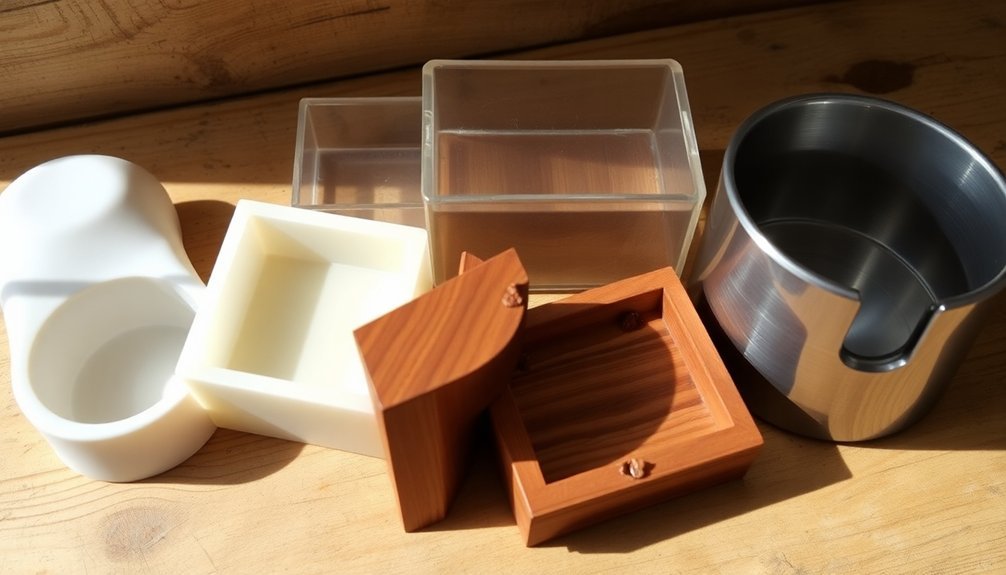
When choosing a soap mold material, you'll find several options that each serve different needs in the soap-making process.
Silicone molds offer exceptional ease of unmolding and flexibility, making them a top choice for both beginners and experienced crafters.
Wooden molds excel in structural support and are perfect for larger batches, though you'll need to line them before use.
While plastic molds are budget-friendly, their limited durability might affect your long-term soap making success.
Acrylic molds provide excellent visibility for detailed designs but come at a higher price point.
As you weigh the pros and cons of these material types, consider that silicone and wooden molds consistently rank highest among soap makers for their combination of durability and practical benefits.
Benefits of Silicone Molds for Long-Term Use
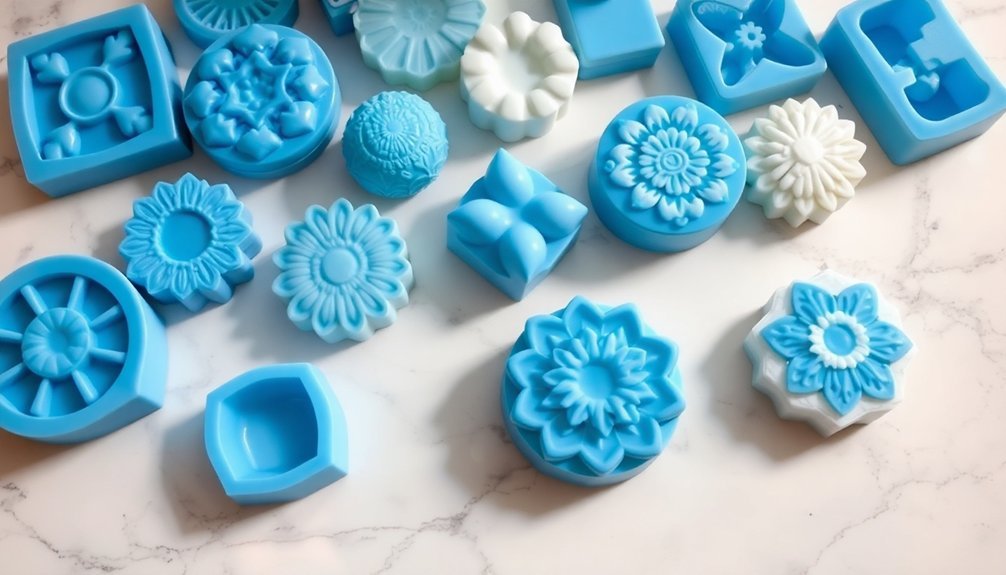
With their exceptional durability and resistance to temperatures from -40°F to 450°F, silicone molds will serve you reliably for countless soap-making batches without warping or deteriorating.
You'll find that silicone's non-stick surface makes releasing finished soaps effortless, eliminating the need for additional liners or excessive cleanup time.
The material's chemical resistance prevents it from absorbing scents or colors, ensuring your soaps maintain their intended qualities batch after batch.
Durability And Easy Release
Among the many advantages of silicone soap molds, their exceptional durability and easy-release properties make them a standout choice for long-term soap making.
You'll find these cost-effective molds can withstand years of continuous use while maintaining their shape and non-stick properties.
The heat-resistant nature of silicone molds allows you to work with temperatures up to 500°F, making them versatile for both melt and pour and cold process soaps.
Their flexible design lets you easily twist and bend the mold to release your finished soaps without damaging them. You won't need additional lining or release agents, saving you time and materials.
Maintenance is a breeze since they're dishwasher safe, ensuring your molds stay clean and ready for your next soap-making session.
This combination of features makes silicone molds an excellent investment for your crafting needs.
Temperature And Chemical Resistance
Thanks to their exceptional chemical stability and temperature tolerance, silicone molds provide unmatched protection during both hot and cold soap-making processes.
You'll find these versatile tools can withstand temperature variations from -40°F to 450°F, making them perfect for any soap-making method you choose.
Why silicone molds are your best choice for temperature and chemical resistance:
- You won't worry about toxic chemicals leaching into your soaps, thanks to their non-toxic composition
- Your molds will maintain their shape, even under high heat conditions
- You'll experience frustration-free demolding due to their temperature-stable flexibility
- Your intricate designs stay intact through countless uses
- You'll save time with easy cleanup thanks to non-stick properties
These temperature-resistant, chemically stable molds guarantee consistent results and longevity, making them an excellent investment for your soap-making journey.
Wooden Molds: Traditional Durability Meets Versatility
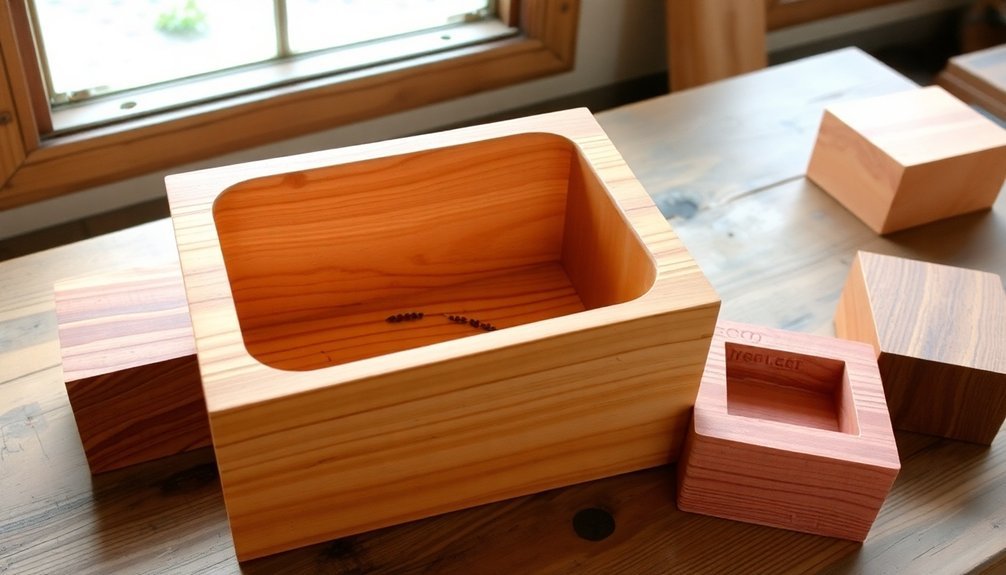
As soap makers have discovered over generations, wooden molds stand as a cornerstone in traditional soap making, combining practical durability with exceptional versatility.
You'll find these molds particularly effective for cold process soap, as their natural insulating properties speed up saponification.
When you're selecting wooden molds, you'll appreciate their customizable nature, with loaf molds accommodating up to 5 lbs of soap.
The sliding bottoms feature lets you create various soap sizes without struggling with removal.
To protect your investment and guarantee smooth soap removal, you'll need to line the molds with non-stick materials like freezer paper.
Proper care and maintenance of your wooden molds isn't complicated, but it's essential.
Regular cleaning and appropriate lining will extend their lifespan, guaranteeing they remain a reliable tool in your soap-making arsenal.
Metal and Acrylic Options for Professional Results
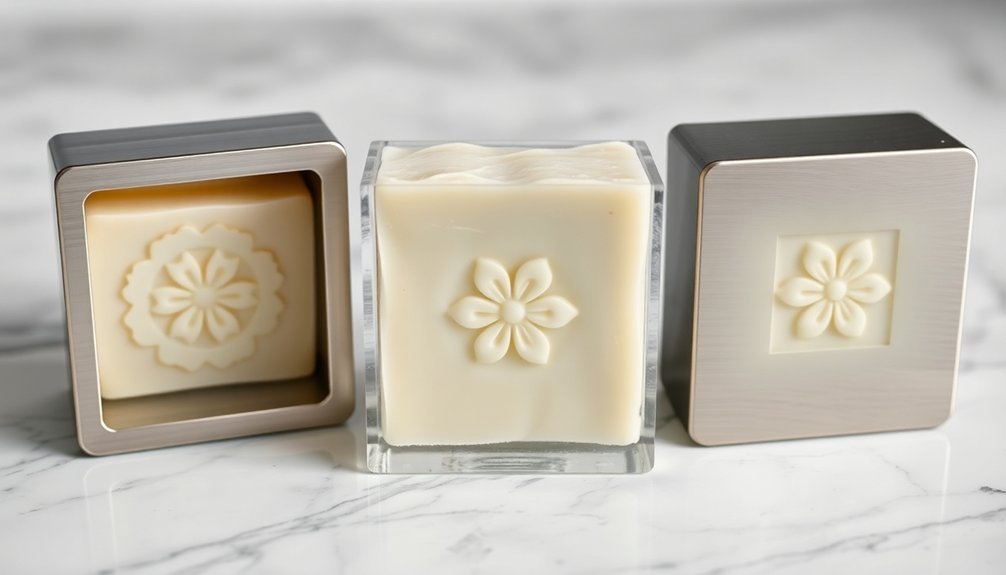
When you're seeking professional-grade soap molds, you'll find metal options deliver exceptional durability and heat retention, producing bars with crisp edges and refined surfaces.
You'll appreciate acrylic molds for their transparency, which lets you monitor your soap's development throughout the curing process without disturbing the batch.
Both materials excel in ease of cleaning and soap removal, with metal providing lasting sturdiness and acrylic offering non-stick benefits that preserve intricate design details.
Metal Durability Benefits
Professional soap makers often choose metal molds for their unmatched durability and resistance to warping.
You'll find that metal soap molds offer exceptional resistance to daily wear, making them a truly long-lasting investment for your craft. Their excellent insulation properties guarantee even saponification, delivering consistent results batch after batch.
- Your soaps will showcase sharp edges and clean lines that scream professional quality
- You'll never worry about warping or degradation, even after years of use
- Your investment pays off with countless perfect batches of soap
- You'll experience quick unmolding without damaging your creations
- Your soaps will cure evenly thanks to superior heat distribution
These robust molds maintain their structural integrity through countless uses, helping you achieve professional-looking results consistently.
The durability of metal molds makes them an essential tool for serious soap makers committed to quality.
Acrylic's Visual Appeal
Transparency champions will appreciate acrylic soap molds for their unmatched visual clarity during the creation process. You'll be able to monitor your intricate designs and color layering with perfect precision, guaranteeing each soap turns out exactly as planned.
The durable and rigid nature of acrylic molds sets them apart from standard plastic options. You won't have to worry about warping or cracking, and their smooth surface guarantees effortless soap release every time.
Professional soap makers particularly value these molds for their ability to handle both cold and hot process methods without compromising structure.
While you might initially hesitate at their higher price point compared to other materials, acrylic's longevity and reusable nature make them a smart investment.
Their visual appeal combined with outstanding durability delivers consistent, professional results batch after batch.
Removal and Release Tips
Now that you've chosen your ideal mold material, mastering proper release techniques will maximize your investment. Both metal molds and acrylic molds require specific care to guarantee successful demolding soap. You'll find that a mold release agent is essential for smooth results.
- Use mineral oil or silicone-based mold release spray on metal molds to prevent your soap mixture from sticking.
- Watch your creation through clear acrylic molds as it cures, then run a thin knife along the edges.
- Apply a gentle heating method like a warm water bath to both materials for easier release.
- Treat acrylic surfaces with dedicated release agents before each pour.
- Consider both materials' unique properties – metal's heat retention and acrylic's visibility – when planning your release strategy.
Maintenance Tips for Extended Mold Lifespan
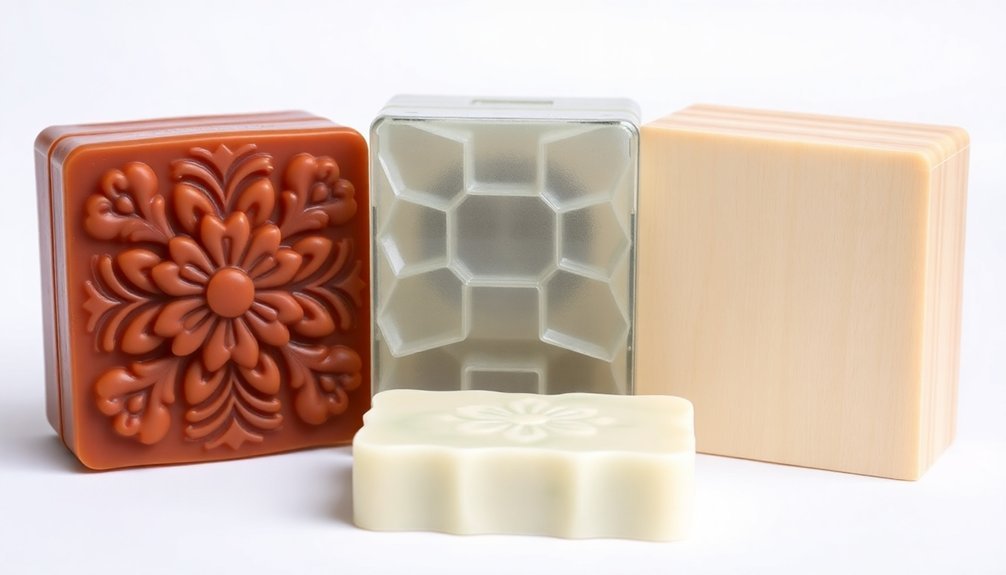
Taking proper care of your soap molds is crucial to maximize their longevity and maintain their performance.
Clean your silicone molds with warm water and mild dish soap after each use, and don't scrub them with abrasive materials that could compromise their non-stick surface.
For wooden soap molds, you'll want to line them with freezer or parchment paper before each use. This simple maintenance step prevents soap from sticking and protects the wood from moisture damage.
When it comes to storage, keep all your molds in a cool, dry space to prevent warping and deterioration. Before storing, verify they're completely dry to avoid mildew, especially with wooden varieties.
Remember to avoid harsh chemicals during cleaning, as they'll reduce your molds' lifespan and effectiveness.
Selecting the Right Size and Shape for Your Needs
Choosing the perfect soap mold size and shape can make or break your soap-making success. When you're ready to start making soap, you'll find that soap molds come in various configurations.
While individual cavity molds work best for small batches, larger wood molds suit bulk production perfectly. Silicone molds are easy to use and offer incredible versatility for creative designs.
- Feel the satisfaction of perfectly unmolding your first batch
- Experience the joy of creating unique shapes that reflect your style
- Discover the freedom of scaling your production up or down
- Embrace the flexibility of switching between mold types
- Imagine the pride of crafting custom silicone designs
Consider your production volume, preferred soap shapes, and making method when selecting your molds.
Whether you choose cavity silicone for artisanal pieces or wooden loaf molds for larger batches, the right choice will enhance your soap-making journey.
Common Problems and Solutions With Reusable Molds
While reusable molds offer convenience and cost savings, they can present several common challenges that soap makers need to address. You'll find that silicone molds, though naturally non-stick, can still have sticking issues that a quick coat of mineral oil or cornstarch will resolve.
| Problem | Cause | Solution |
|---|---|---|
| Sticking Issues | Surface tension | Apply mineral oil/cornstarch |
| Air Bubbles | Trapped air during pour | Tap mold gently on surface |
| Cleaning Challenges | Oil residue/scents | Clean with vinegar solution |
| Durability Concerns | Heat exposure | Store away from heat sources |
| Demolding Difficulties | Soap hardening | Freeze briefly before removal |
These flexible, reusable molds will last longer when you properly address these common issues. Remember to tap your molds to release air bubbles, and if you're struggling with demolding, a quick trip to the freezer can make removal much easier.
Frequently Asked Questions
What Is the Best Material for Soap Molds?
You'll find silicone molds are your best choice for soap making. They're flexible, durable, and don't need lining. While wooden molds offer great insulation, silicone's easy release makes it the top option.
What Is the Best Material to Make a Mold Out Of?
You'll find silicone is your best choice for making molds. It's flexible, durable, and won't stick to your creations. Plus, it's heat-resistant and easy to clean after each use.
What Is the Best Material to Make Resin Molds?
You'll find silicone is your best choice for resin molds. It's flexible, durable, and non-stick, making demolding easy. HDPE's also a good alternative if you're looking for a sturdy, long-lasting option.
Are Silicone Molds Good for Soap Making?
Yes, you'll find silicone molds are excellent for soap making. They're flexible, heat-resistant, and easy to clean. Your soaps will release effortlessly, and the molds' durability means you can reuse them for years.
In Summary
When choosing reusable soap molds, you'll find silicone stands out as the top material for its flexibility, durability, and easy release properties. While wooden molds offer rustic charm and metal provides professional-grade results, silicone's non-stick surface and long lifespan make it the most practical choice. Remember to properly maintain your molds, regardless of material, and you'll create beautiful soaps for years to come.
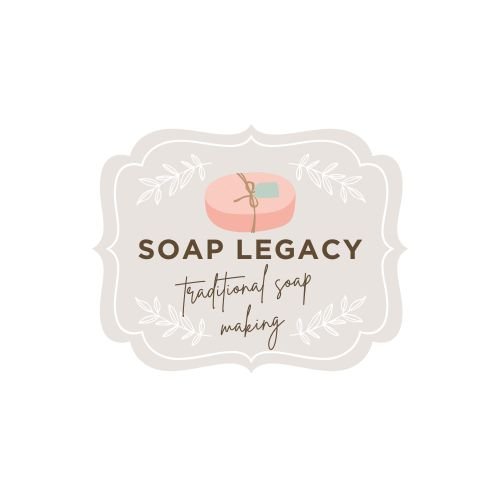
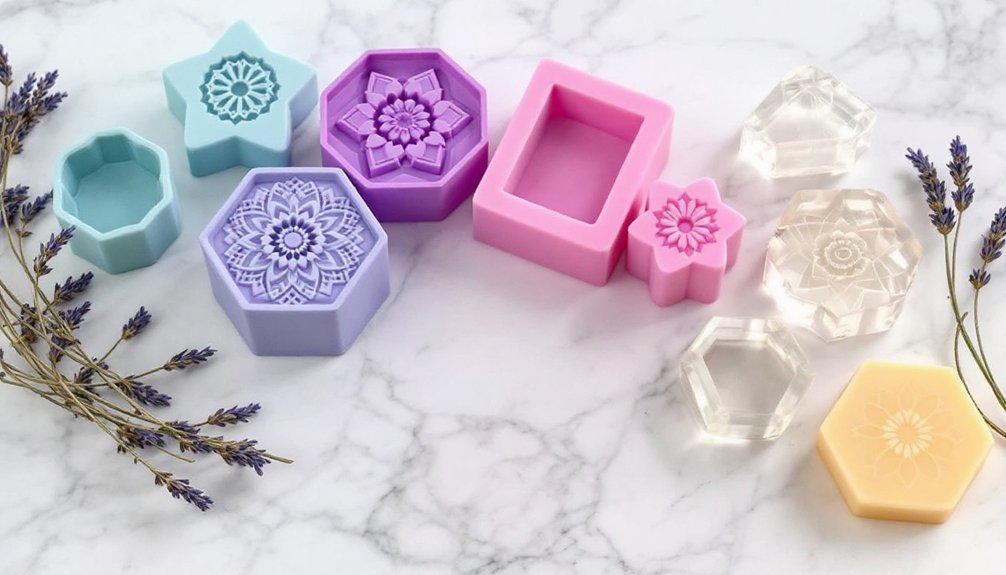
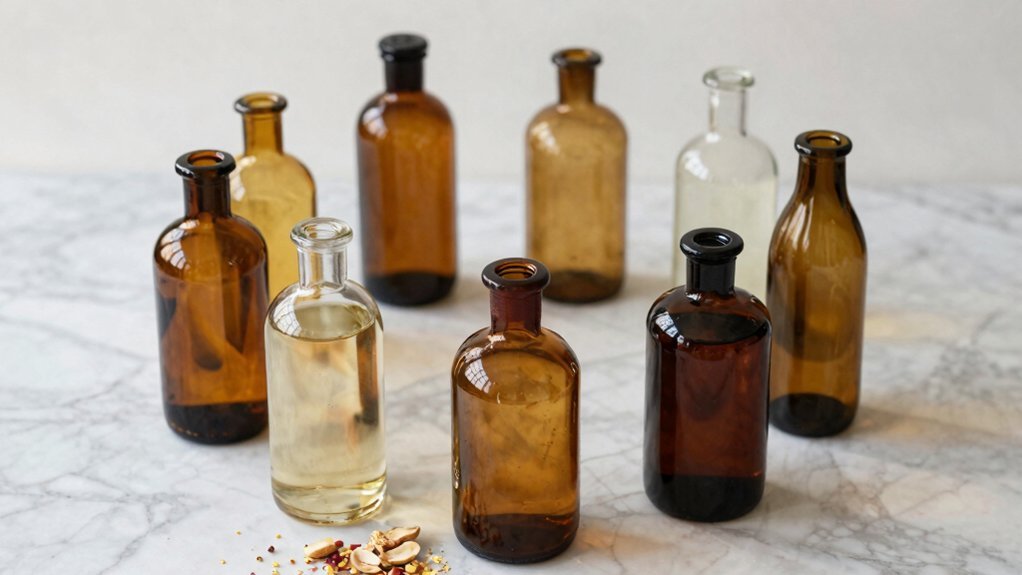
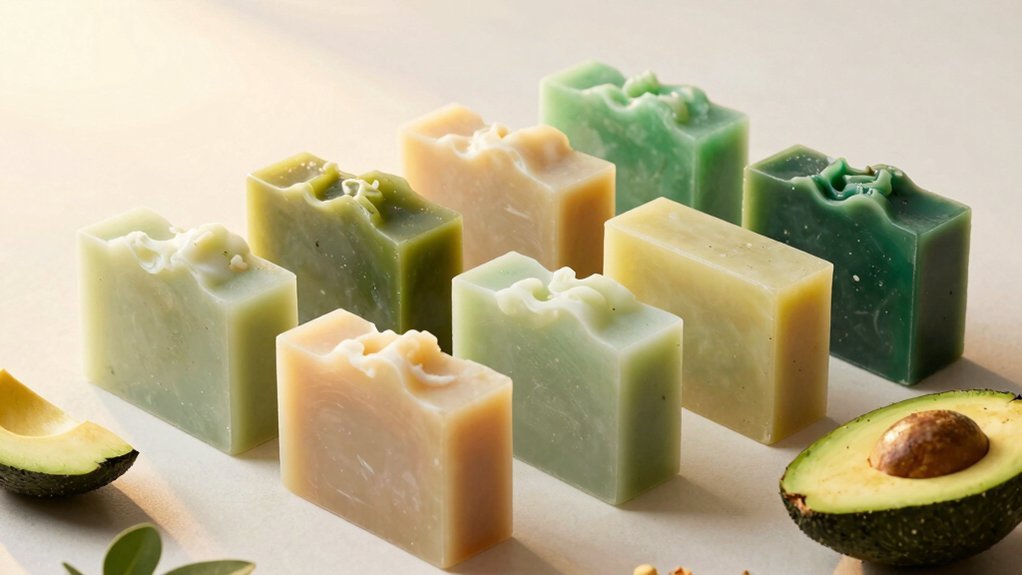
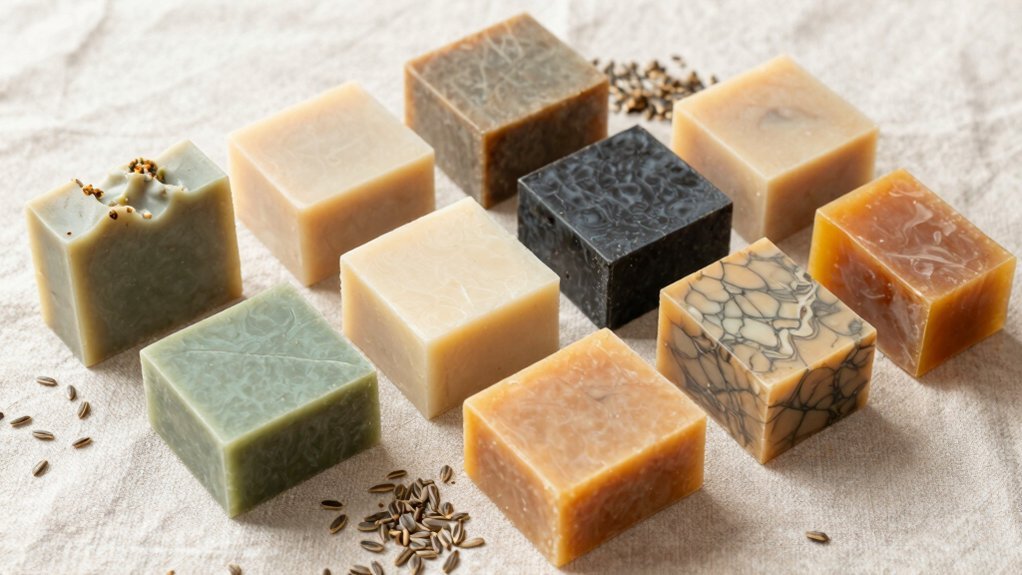
Leave a Reply